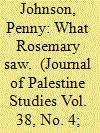|
|
|
Sort Order |
|
|
|
Items / Page
|
|
|
|
|
|
|
| Srl | Item |
| 1 |
ID:
175784


|
|
|
|
|
| Summary/Abstract |
No practical decisions and steps have been taken to achieve actual change on the ground to ensure the rights of Palestinian women, who suffer from violence stemming from the Israeli occupation and repressive measures, political paralysis, an outdated legal system, poverty and unemployment, and the effects of the coronavirus pandemic.
|
|
|
|
|
|
|
|
|
|
|
|
|
|
|
|
| 2 |
ID:
187000


|
|
|
|
|
| Summary/Abstract |
Using feminist anthropology and interview data, this article investigates the gendered dimension of hunger striking in Israeli prisons. It draws on other cases from Ireland to the United States to explore the gendered nature of resistance to political imprisonment. I argue that women hunger strikers are active participants who weaponize their lives to resist the Israeli matrix of power and patriarchal societal norms. There have been less women in number when compared to male prisoners, but women have been more effective in collectively coordinating their pioneering action. Through necroresistance (transforming their body to a site of resistance) and the strategy of sumud (Arabic for ‘steadfastness’), women prisoners practice a dual resistance of the colonial authorities and the patriarchal society — simultaneously reclaiming ownership of their bodies and lives from both systems. This does not entail constituting their bodies as masculine (or de-feminizing themselves) so they are protected from sexual abuse. Rather, they insist on feminizing their experience and challenging gendered stereotypes of women as ‘victims’ with ‘fragile bodies’. For them, gender is not a barrier but a motivational factor in which self-sacrifice to protest injustice is far superior to enduring the wrongs of political imprisonment.
|
|
|
|
|
|
|
|
|
|
|
|
|
|
|
|
| 3 |
ID:
146133


|
|
|
|
|
| Summary/Abstract |
This article contributes a different approach to discussions of resilience and resistance by arguing that within the current literature, there is too little attention to how communities may engage in their own resilience building without outside intervention or interference. Further, this article will argue that the literature which poses resilience as fundamentally different from resistance overlooks the ways in which resilience can be seen as a tactic of resistance through the lens of infrapolitics. The article uses the Palestinian example of sumud to illustrate these two points. Sumud is a tactic of resistance to the Israeli occupation that relies upon adaptation to the difficulties of life under occupation, staying in the territories despite hardship, and asserting Palestinian culture and identity in response to Zionist claims which posit Israelis as the sole legitimate inhabitants of the land. Sumud represents a “resilient resistance”—a tactic of resistance that relies on qualities of resilience such as getting by and adapting to shock. Thinking about sumud as a form of resilient resistance challenges the resilience literature to engage with a greater variety of forms of resilience.
|
|
|
|
|
|
|
|
|
|
|
|
|
|
|
|
| 4 |
ID:
179083


|
|
|
|
|
| Summary/Abstract |
Palestinian female identity has been constructed and reconstructed as an amalgamation of patriarchal-oriented roles (daughter, wife, mother, sister, grandmother or even aunt), demonstrating women’s exclusion from the realm of men who have proper names to locate them within a family group. This article examines the suppression of the female name and the use of reference and terms of address as euphemisms for women in contemporary, non-urban Palestine. While the exclusion of the female name from the public sphere fuels feminists’ criticism of this patriarchal dehumanization, objectification and commodification of the female, we contend that the possibility of undermining Palestinian patronymic culture is shattered because women publicly advertise themselves as the sister, mother, daughter and wife of someone and, hence, their participation in the conventionally male-dominated sphere of politics upholds their subordination.
|
|
|
|
|
|
|
|
|
|
|
|
|
|
|
|
| 5 |
ID:
092955


|
|
|
|
|
| Publication |
2009.
|
| Summary/Abstract |
Referencing the 'stereotypes of self' identified by Rosemary Sayigh in the life stories of Palestinian camp women in Lebanon who had lived through the Palestinian resistance, the author focuses on the narratives of two women in Ramallah's Am'ari refugee camp since the outbreak of the al-Aqsa intifada to reflect on the Palestinian present. Though the women-and their goals and struggles-could not be more different, their narratives reveal significant shifts in self-representation that reflect both the impact of post-Oslo political realities and the new (unattainable) aspirations fueled by satellite television images and Ramallah café culture. The narratives also reflect, in very different ways, the national crisis, the impotence of Palestinian political groups and institutions, and the erosion of solidarities.
|
|
|
|
|
|
|
|
|
|
|
|
|
|
|
|
| 6 |
ID:
130507


|
|
|
|
|
| Publication |
2011.
|
| Summary/Abstract |
It was a note in the Israeli daily Haaretz informing readers that the state attorney's office had asked the police to start an investigation against author and editior Ilana Hammerman which outraged some of us. Hammerman attracted attention when in May 2010 she bravely published a detailed magazine article describing a trip to an Israeli beach in the company of three Palestinian girls.
|
|
|
|
|
|
|
|
|
|
|
|
|
|
|
|
|
|
|
|
|